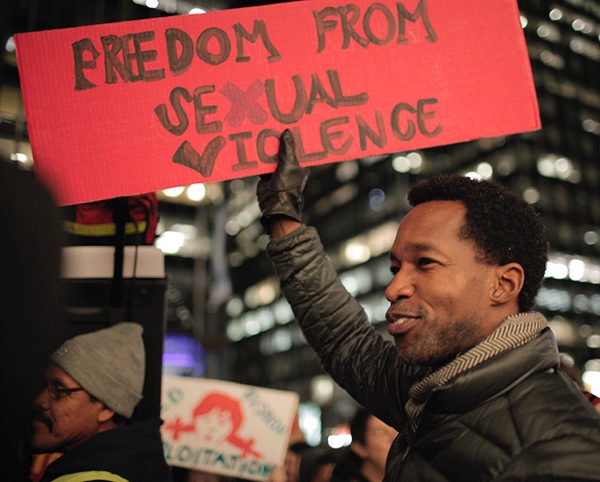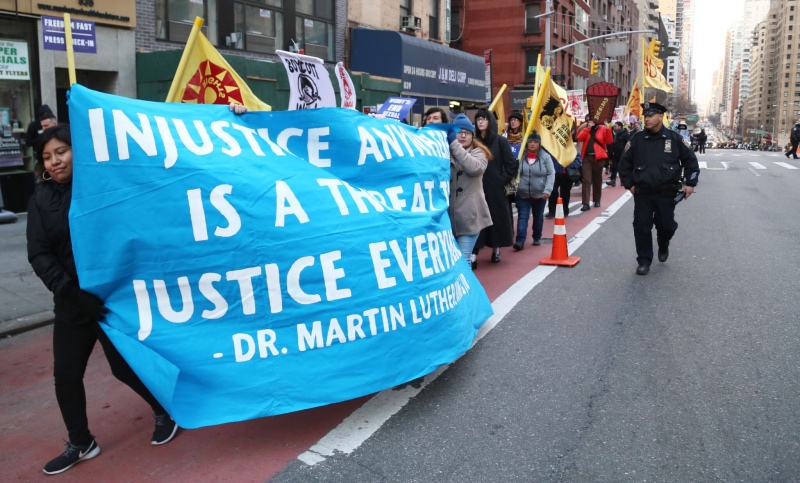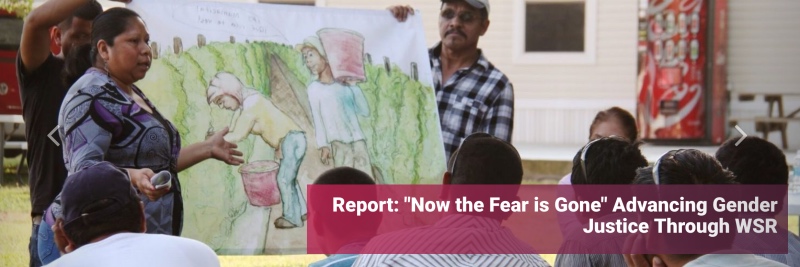
“By rectifying long-standing power imbalances, Worker-driven Social Responsibility drills into the foundation of the problem…”
“No gender-based violence programs have achieved the same amount of leverage in fostering change…”
Earlier this week, Civil Eats published an excellent, feature-length piece based on interviews conducted during the Freedom Fast in New York City that lends critical insight into the endemic, generations-old problem of gender-based violence in the agricultural industry – and the promise that the Worker-driven Social Responsibility model, fulfilled in the Fair Food Program, holds for eradicating such violence in low-wage workplaces around the globe.
UC Berkeley PhD student Vera Chang’s piece, entitled “Meet the Farmworkers Leading the #MeToo Fight For Workers Everywhere,” is one you won’t want to miss. The article, which lucidly weaves through the problem and the proven solution, was picked up by Change.org and blasted out to the whopping 117,000+ that have pledged to boycott Wendy’s. (If you haven’t already signed, take a moment to do so and then share with your networks!).
Today, we are pasting key excerpts from the article, beginning with an exposition of the problem:
… An estimated 500,000 women labor in U.S. fields. On many of the farms where Raquel’s parents worked up and down the East Coast, farmworkers describe coercion, catcalls, groping, and assault from crew leaders, supervisors, and even fellow workers as their “daily bread” in the fields. A study found that four out of five female farmworkers experience sexual violence at work. Women are often dependent on male supervisors for employment, housing, and transportation. Claims against harassers are largely processed by male managers, police officers, and judges, and retaliation for complaints is the norm.
Isolating physically and socially, the informal work environment of commercial agriculture on many farms creates a “hustle culture” that threatens workers’ immediate safety and long-term health. In crop work, for example, portable toilets are often placed far from the fields, a tactic that keeps them from taking breaks, said Nely Rodriguez, a CIW leader. Workers must obtain permission to use the bathroom, which creates uncomfortable situations as women find themselves alone with crew leaders. “It’s easy for unwanted things to happen between the rows. You’re in their territory, so it’s easy for them to find and entrap you. I saw this in my own case,” Rodriguez says, who felt corralled because her former boss carried a pistol.
The advent of CIW’s Fair Food Program has changed that culture significantly; alongside the #MeToo and Time’s Up movements, the Fair Food Program is sparking change for workers and women in many industries…
Ms. Chang then dives deep into an intelligent analysis of why and how the Fair Food Program, as the “first full functioning example of a new model for protecting human rights for low wage workers,” works where other initiatives to combat sexual violence fail:
… The WSR approach is distinguished from CSR by the fact that its design emerges from the very community most affected by the exploitation it was created to prevent and extinguish. In Immokalee’s case, the Fair Food Program was built by and for workers like Rodriguez, Salucio, and Perez. This is important not so much for ideological as for practical reasons.
“The myriad ways in which perpetrators can be abusive is spectacularly creative—if you stop abuse in one place it pops up in another,” said Cathy Albisa, director of the National Economic & Social Rights Initiative, which houses a growing WSR Network, a coalition of worker and human rights organizations. “Only the worker knows all the different ways this happens and how to design a program that stops it.”
Despite its goal of ending sexual harassment, the Fair Food Program was not designed as a sexual harassment program. “While counterintuitive, you can’t end gender-based violence by working directly on gender-based violence,” Albisa explained. “You can only end gender-based violence by working on structural issues that enable it, and those also shape the wider array of abuses affecting the whole community.”
By rectifying long-standing power imbalances, WSR drills into the foundation of the problem, addressing multiple abuses simultaneously. No gender-based violence programs have achieved the same amount of leverage in fostering change, noted Albisa, who has been working in women’s and social justice movements for the past two decades.
A central mechanism of WSR is the enforcement of its standards through the application of strict market consequences for the most egregious human rights violations. In the case of the Fair Food Program, “zero tolerance” for abuses like slavery and sexual assault is backed up by a system of enforcement. Since the program was launched in 2011, seven growers were suspended for violations, 12 supervisors were terminated for sexual harassment, and 36 supervisors were disciplined for sexual harassment.
As Cruz Salucio explained, “It’s like we have a basket of apples, and we keep on removing the bad ones,” so the culture of worker health and safety keeps getting stronger. Credible threats of lost employment and business are potent incentives for industry-wide compliance that can lead to structural change. Disciplinary actions, supervisor re-training, and effective human resources stop the recurrence of violence, according to the Fair Food Standards Council, the program’s third-party monitoring body led by a former New York State Supreme Court Justice.
Grievance data on farms participating in the program reveal that, although the number of complaints has not gone down since the beginning of the program, the severity of complaints has lessened. Fair Food Standards Council investigators say that in the last eight years, they have received and investigated over 2,000 worker complaints and that the program has brought an end to impunity for discrimination and other forms of gender-based violence on participating farms.
Their just-released report indicates that there have been no reported cases of rape and attempted rape since the 2011 season, when the program was put in place, and cases of sexual harassment with physical contact by supervisors have been virtually eliminated (only one such case has been reported since 2013). Spending time with workers during Fair Food Standards Council audits reveals their confidence and eloquence as they speak to issues that concern them…
But as followers of the Fair Food Program know, the principles and mechanisms of Worker-driven Social Responsibility are already being adapted for other industries. The Civil Eats piece concludes by describing the WSR model’s exciting replication in two seemingly disparate industries: dairy farming and fashion modeling:
… Vermont’s Migrant Justice, a worker-led human rights organization, recently launched Milk with Dignity, the program’s first major adaptation, and the group is already working with its first corporate partner, global ice cream maker Ben & Jerry’s. Migrant Justice’s history offers insight into the shift from traditional legal and corporate social responsibility approaches to the WSR regulatory model…
“Now,” she continues, “if there’s harassment or any kind of violence, workers can call the Milk with Dignity hotline, a Milk with Dignity Standards Council investigator will answer the phone in a language they understand and address the problem immediately. There are systems in place.”
Migrant Justice staffers report that the working conditions in Vermont’s dairy industry are rapidly improving. With Milk with Dignity, it will be safer for women to be on farms, so the organization brought on more women field organizers to educate and raise awareness about sexual violence. “I can feel the change in attitude and responses of women to abuses. It’s a new day. It’s really amazing,” added Canedo.
On the heels of Migrant Justice’s WSR launch, Model Alliance—an advocacy organization focused on combating sexual assault of the fashion industry—is consulting with CIW and the Worker Rights Consortium in the development of a code of conduct and enforcement regime based on the Fair Food Program. Though farm laborers and fashion models have very different work environments, women’s experiences of sexual misconduct are similar across industries.
“Unlike farmworkers, fashion models are highly visible, and while their job appears to be glamorous, the reality of models’ working lives can be far from it,” Model Alliance’s Executive Director Sara Ziff told Civil Eats. Working models experience chronic harassment, pressures to sacrifice their health to be thin, and lack of financial transparency and timely pay. In some cases, models are children working in debt to agencies. “Without clear penalties for violations and proper complaint and enforcement mechanisms, [efforts] fall short of protecting the people who are vulnerable to abuse.”
Echoing CIW leaders’ worries, Ziff observes that neither legal protections nor companies’ internal policies introduced in the wake of the #MeToo and Time’s Up movements have proven adequate to prevent assault. Model Alliance is turning to WSR as a model because of its legally binding commitments, education on rights and responsibilities, and productive complaint channels.
Head over to Civil Eats to check out the article in full!



